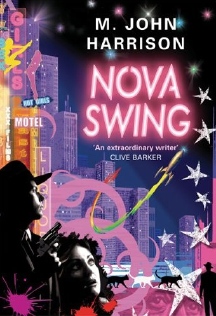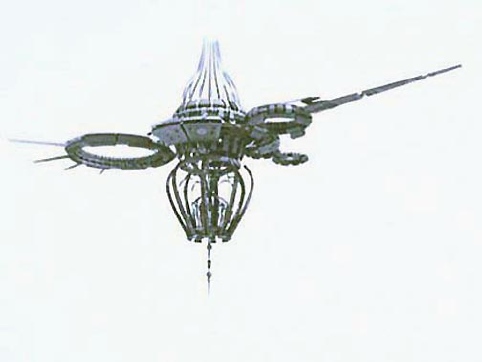|
|
|
|
This Just In...News
From The Agony Column
|
| |
|
07-07-07: Preview for Podcast of Monday, July 09, 2007 : Are you doing the right thing?
Here's an MP3
preview of the Monday July 09, 2007 podcast for The Agony Column.
Enjoy!
|
| |
|
07-06-07: Al Reynolds Stalks the Mean Streets of the Glitter Band with 'The Prefect'
|
Small Men and Big Ideas
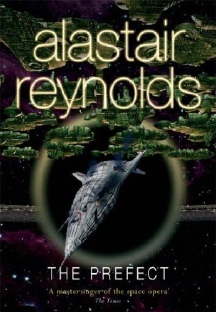 |
|
| Consistently
cool cover art from Gollancz UK. |
One of the highlights
of WorldCon gosh, was it only last year, 2006? – was
hearing Alastair Reynolds read a portion of this then-forthcoming book,
'The Prefect'. It was in a tiny, closed up room. We could have been
aboard a particularly cramped spaceliner. The lights were dim, the room
was claustrophobic.
Then Al began to read.
What unfolded, as he read, sent chills down my spine. His novel may have
been set in his 'Revelation
Space' future, in a pre-plague Yellowstone
system. All the wonderful baroqueries were in place, the deep-background
of an invented technology, the scenes, the steps, the descriptions were
all there. For anyone who has immersed themselves in Reynolds world, it
was a treat. The novel concerns the covert takeover of the Glitter band,
a series of orbiting habitats, and offers all the complexities you'd want
from Reynolds; great imagination, powerful characters and of course Revelations.
Yes, Reynolds seems to specialize in these to let readers peel away the
layers of the onion-worlds he's created to see their suspicions about characters
brought to light. You've got characters who seem small and concrete enough
to be real, grabbable people, stalking mean streets in a weird future.
Small men and big ideas behind it all. All of that there; prose, cleaner
than ever, but applied to the chaotic, gorgeous world of his future. All
of it there.
But that wasn't what caught me.
No, in the portion he read, Reynolds tapped into an experience that is
unique to the late twentieth and early twenty-first century. Let me tell
my tale.
It must have been about twelve years ago, when I was still IT director
at a Scotts Valley musical instrument manufacturer, that I took it
upon myself to upgrade our then-ancient VAX system so that it could
share files
with PC's and Unix systems. In order to do this, I had to install what
was then-called NFS (Network File System) software on the VAX. The
problem was I was then a UNIX guy. I didn't know much about VAXen and
didn't see
the need. The machine we had was nearly 20 years old and I was shopping
for an ERP system to replace it. Still, it was the key machine on our
site. ALL – ALL – our corporations financial records were
on that machine. So I called in the expert.
The expert was a friend who had worked a bazillion years on VAXen for
the US government, in lots of top-secret applications. I believe he
worked
on creating databases to project kill-counts from space-based lasers;
I don’t really know he hinted at a lot of stuff. (When I pointed him
to the CARET article recently, he emailed me, "I worked with some
of that stuff, but I can't tell you anything.") He's done his
time under fire while military mucky-mucks cooled their heels and asked
him
when the system would be up. He was qualified.
The install went perfectly. We genned a backup kernel, we ran the weird
format VAX tape, re-genned, rebooted and:
And:
And:
The system would not boot.
"Mike, we've just destroyed twenty years of financial data for my company.
We've ruined the company financially. Ruined it."
A look passed between us. To this day, both of us feel that moment was
the deepest pit of fear and despair we've ever experienced. The crushing
knowledge, the endless consequences playing out in the week to follow oppressed
us with a terror that was incomparable.
We called the Financial admin for VAX, and told her what we’d
done. She told us to power the system down and then let it come up.
It did.
Freedom.
But not really. The moments of terror we experienced were real. And
I know lots of people who have had their own versions of these moments,
upgrading
their home PC's and seeing data disappear, upgrading software only
to find it can't read any old files, or simply won’t run usably
on the current hardware.
The software upgrade gone bad.
Reynolds captured that whole feeling in his reading, slammed it home with
a power that only a great writer, working the unconscious can muster. This
is your Revelation. This is 'The Prefect'. Take it easy. Maybe you can
fix things with a hard reboot.
|
| |
|
07-05-07: M. John Harrison Does the 'Nova Swing'
|
One Foot in the Zone
|
|
Be
glad I'm showing you the UK cover. Thank you Simon Spanton
and Victor Gollancz.
|
It's odd what books stick with you through the years and why. Back
in the 1980's, when I was on a Stanislaw Lem binge, I also looked into
a number
of other Russian authors. There was a series of trade paperbacks
that came out during those years, many of them featuring an introduction
by
Theodore Sturgeon writing under a pen name. I bought a bunch of them
and dult read and largely enjoyed them. I read a novel by Mikhail
Bulgakov, who if I am not mistaken, gets a name check in Richard Morgan's
novel
'Black Man'. [I'm not at home at the moment, otherwise, I'd check
the stacks and verify the title; moreover, the internet connection
I have
is so slow and unreliable I can't really look at any of the online
biblios either.]
The standout novels were those most highly recommended by Lem, a few by
the Strugatsky Brothers. I absolutely loved 'Definitely Maybe', a novel
in which the laws of physics are slowly changing. It was a short, smart
novel that was very reminiscent of the best work of Philip K. Dick, full
of crazy conspiracies and surreal scenes. But my favorite had to be 'Roadside
Picnic', and not because it had been adapted by Andrei Tarkovsky as 'The
Stalker'. Of course, Tarkovsky also adapted Lem's 'Solaris' as well, and
while he didn't have the money to create some of the spectacular effects
suggested by the prose and he did do his usual, peculiar take on the novel,
at least he did not murder it in the manner done by the more recent American
adaptation. It comes pretty close to capturing some ambience remotely resembling
that of Lem's work.
And likewise, 'The Stalker' is a good movie, but it too has Tarkovsky's
stamp on it. If you read 'Roadside Picnic', you'll find a rather different
story and feel. The premise of the Strugatsky Borthers' novel is that
the Earth finds itself in the firing range of some unknowable alien
force.
It might be an attempt at communication, invasion, an accident – we
don’t know. All we do know is that a series of Zones are created.
Imagine someone firings a huge cosmic gun at the earth as it revolves.
Five shots say, creating five Zones. Each Zone is unknowable, dangerous,
liable to transform that within into something incomprehensible or
simply dead. In the Tarkovsky movie, the Zone is clearly created as
a reference
to Chernobyl. But in the Strugatskyy Brothers' original novel, the
scene is much more Blade Runner. Around each Zone, a sort of bootleg
culture
has grown, filled with weird artifacts and strange social conventions
and technologies. The Tarkovsky movie will always be with for its serene
and
unreal visions of this earth. The original novel will always be with
me for its complicated, spiky vision of what happens socially and culturally
when our world meets something unknowable.
All this goes round to saying that you're in for a similar experience
when you read 'Nova Swing' (Bantam Spectra / Random House ; October
2, 2007
; $16) by M. John Harrison. (Point of order is that this was available
from Victor Gollancz last year, I believe; those desiring a better
cover treatment and the hardcover first edition original had best start
their
search engines.) 'Nova Swing' is Harrison's follow-up to his brilliant
and blinding 'Light', and offers up a quote from the Strugatsky Brothers'
work before the novel begins. In 'Nova Swing', parts of the mysterious
and unknowable Kefahuchi Tract have managed to fall to Earth, creating
the Saudade Tract.
It's The Zone for a new millennium, as imagined by the inimitable M.
John Harrison. Vic Serotonin is a "travel agent" (read: Stalker) for
those who wish to venture there and try to bring something back. Unfortunately,
what's afoot is quite likely to be the undoing of reality – at
least, the reader's reality if not the characters'.
That's because Harrison is an absolute master of suggesting the ineffable
of keeping the reader's mind on the edge of comprehension. There's
a certain effect that science fiction can achieve that's often referred
to as "the
sense of wonder". Harrison turns that up to eleven. Nowgranted,
not all readers can take that leap. Harrison zigs when you expect him
to zag
and he backs off when you expect him to zoom in. But readers who like
this sort of writing know who they are and they'd best line up to get
this novel.
It's every bit as surreal but quite a bit more directed than 'Light'.
But whatever it is, it comes from the Zone, which itself might be seen
as a
metaphor for the entire genre of science fiction, the point where literature
breaks down, falls apart, re-configures into strange shapes that seem
familiar but aren't. 'Nova Sing' is a series of stars in that galaxy.
Just random
points of 'Light'. But viewed from our Earth, they form a constellation.
They tell us a story.
|
| |
|
07-04-07: Science Fiction Independent of Books
|
"My Experience with the CARET Program and Extra-terrestrial Technology" By "Isaac"
Once in a while
something science fictional too good to ignore happens in the real
world. I really enjoyed the John Titor "time traveler" story,
for example. It featured a decent lead character, John Titor, an interesting
science fiction story (he traveled back in time to avert or at least describe
an upcoming disaster [as if the present is not one]), and a fascinating
execution that played out in dribs and drabs over the web, culminating
in the official John Titor Times website.
It's gotten a bit cheesy but it' still fun. Here you'll learn how John
Titor arrived from 2036 in 2000, talked about his time machine, hung out
for
some fourth months, then went back to the future. It's a really interesting
form of metafiction and a fascinating use of the web and internet forums
as a storytelling machine. Of course, the lingering doubt as to whether
it just might be true adds a sort of spice to the proceedings that no fiction
can duplicate. You may or may not believe the "truth" of the
John Titor story, but experiencing it as it unfolded and even now, in retrospect
is a fascinating reading experience.
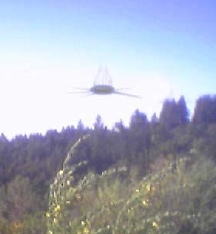 |
|
| Cool,
huh? It gets better. |
Now let's ratchet back to April, 2007. That's when someone on the Forteana
list posted a link to an Coasttocoastam.com
story with some pretty amazing
photographs of what the sender told the website was a silent, bizarre UFO.
These photos were hands-down the clearest I've ever seen, and as one might
expect in these days of digital manipulation, highly suspect. The first
one is a blurry shot of what looks like an upside-down metallic jellyfish
floating over a forest. That one, "Chad", as the sender called
himself, said, was taken with his wife's cell phone. The subsequent photos
were simply breathtaking even if they were fakes. The UFO design was so
cool, the photo-faking so perfect that it had the power of truth even if
it was intuitively a fake. Immediately the it-was-faked accusations and
analysis began. Obviously, any of the images could have been photoshopped.
But even those who claimed it to be possible were quick to point out that
it would not be easy. Still and all, simply some interesting bits of UFOiana,
not science fiction.
|
|
| UFOs
over Tahoe. From "Chad". It's oh-so-BIFF! (And I realize
that I date myself with the BIFF reference. Intentionally.) |
Not yet.
About a month later, in the city of Capitola, not five miles from where
I live, there was another sighting of one of the mysterious drones. As
one who lives so close, I can attest that I heard nothing about this in
the local press. But then, the local press is not what one would call thorough.
Still, this sighting did yield up a fresh crop of incredible images, this
time from "Raj1977". The Capitola chief of police saying what
I've already thought – he'd gets hundreds of calls if this thing
were there, and he got zippo. So that seems to put it to rest, though the
Tahoe / Capitola connection is er, interesting.
|
|
| Holy
shit, how come I didn't get to take that picture? |
The craft were clearly
the same, and there was some talk about the strange markings on the "fins" being
either a derivation of a Japanese script or alternately, a Jedi script.
OK, we're heading into science fiction now! But still, the story beyond
the incredible photos is pretty thin and essentially uninteresting. Folks
saw UFOs. Took pitchers. Mind-boggling pitchers. Looked sorta like summat
from Halo. Well whoop-de-whoop. I ain't into that video game vibe, so I
dunno. I just like the look of the craft.
Still, we're not to science fiction. Until June.
|
|
| The
upgraded version of the drone, apparently. For Halo III? |
That's when we got another crop of pictures, this time from Big Basin,
a forested track of trackless forest in the Santa Cruz Mountains. This
time, though it's clearly not the same craft, it's equally clearly from
the same designer. The claim is that a group of eight bicyclists saw it.
It didn't just float in. It blinked in and out of reality like the cheapest
special effect you ever saw. It took them a few tries, but of course they
were eventually able to get another entry in the mind-bogglingly clear
photos contest.
And that's all it took to bring Isaac out of the woodwork. On
his website, "Isaac" finally
takes us in the full-on realms of science fiction, with a wonderfully written
story about working on alien tech in the 1980's and developing commercial
applications. You know that hot Cisco Router your IT department just installed?
Right, that one. Well ...
I'll let Isaac tell his own story. His website deserves the hits, because
this is where the hot book-free science fiction action is at right now.
While you're there, be sure to peruse the deliciously designed 1980's-vintage
manuals and assorted images of similar tech. So metafictionally cool! I
don’t believe a word of it, mostly because unlike the usual "I Walked
With An Alien" story, this one is quite well written and effectively conveys
a sense of wonder that wanders outside the printed page, into that gray
zone where we don’t care if it is the truth, or if the truth itself
boils down to the trite. I want to believe, and a writer can hope
for no greater gift from any reader.
|
| |
|
07-03-07: Paul McAuley Rides with 'Cowboy Angels'
|
Quitters versus Winners
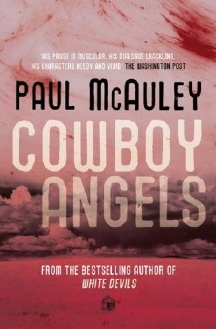 |
|
| Forget
"Don't tread on me." This is the "Don't fuck with me" version
of America. |
Kick ass and take no prisoners. Bust their chops. Let's Drop the Big One
and See What Happens.
Welcome to Cowboy America. You might think you live in some other
version of America, and maybe that's the case – at least in Paul
McAuley's 'Cowboy Angels' (Victor Gollancz/ Orion Books ; September 2007 ; £18.99
HC / £12.99 RPB). McAuley's taken the good ol' multi-universe concept
and used it to send more Americas than you’d care to imagine through
the wringer. 'Cowboy Angels' is a fascinating exercise in dueling cowboys.
On one side of the equation, you have Adam Stone and the Cowboy Angels,
the men who essentially ride herd on the multiverse, protecting alternate
versions of America where things don’t look so hot. At least
according to the Cowboy Angels and the last three Republican presidents
who took
a little program involving Turing Gates and used it to spread democracy
throughout the alternate Americas.
But as the novel starts, there's a new game in town. The last election
brought a very different kind of gool ol' boy into power. Jimmy Carter,
and he's not into any of this democracy as peanut butter bullshit. He's
spreading peace through the multiverse, and the black ops folks that had
their heyday helping foment revolution in an America where the god-damned
Commies took over 1929 are finished.
Or are they? Imagine if the CIA had access to the multiverse, and was
able to tweak history to its liking. That'll give you a sense of the
plot at
work here. They're not going to give it up without a fight, and you
know, the word "fair" ain't a part of the word "fight". Mysteriously,
the word "dirty" is. Who would have thought? Well probably your
local spook recruitment outlet. I don’t recommend going there
to ask.
Now you know earlier on I mentioned that this novel is cowboy vs cowboy,
and I mentioned those on one side – the butt-kickin' bravos bringin'
Democracy with a capital "R" to the multiverse. Those are
the American characters in the novel. Set up against them is another
sort of
Cowboy Angel. That would be the all-powerful author, Paul McCauley,
who has his own fish to fry, most of them American, most of them deserving
the fryolator or something worse. One of the most delightful aspects
of
this novel is the cowboy sensibility of the writer, who pulls no punches
and is not averse to kicking some self-satisfied American asses. The
trick here, and McAuley mostly pulls it off, is to create characters
who seem
real enough to be likable in spite of the fact that they're essentially
fascist pigs wearing the stars'n'bars. Well, you know, fascist pigs,
they always have the same fashion sense, eh?
McAuley's other strength is of course the crackerjack plot he's devised.
He's given himself so many U-turns, secret portals and popup whack-a-moles
that the most surprising thing is how effectively and sparsely he uses
them. Oh, there's plenty of fun to be had here. This is a thriller with
a mirror-maze twist. It's also the kind of book that would be absurdly
easy to make into a movie, and it really plays like one in your head. Perhaps
somewhere out there in the universe, in the sheaf where Alan Turing nailed
quantum computing and emigrated to America, they're watching it now.
|
| |
|
07-02-07: A 2007 Interview with Austin Grossman
|
"I wanted to savor how really cool it is to hang out with superheroes"
Count yourself as
lucky if you've already bought and read 'Soon
I Will be Invincible' by
Austin Grossman. But if you haven’t here's your
chance to hear Grossman himself speak and not just about
writing the book, which is indescribably cool.
When I talked to Grossman,
I was really interested in the process of writing games, and we talked
at length about how he created scripts and just what goes into writing
for games – and why.
Let me add a brief note on the time and date stamp here; I'm currently
on the road, and my dialup connection is terrifically slow. It literally
took three days for me to get these files posted. I shall catch up.
Austin Grossman is a very engaging speaker, and we had an
absolute blast. Here are links to the MP3 and
the RealAudio versions
of the interview. I shall now exercise one of my {only, most famous}
superpowers – the
power of invisibility.
|
| |
|
|



